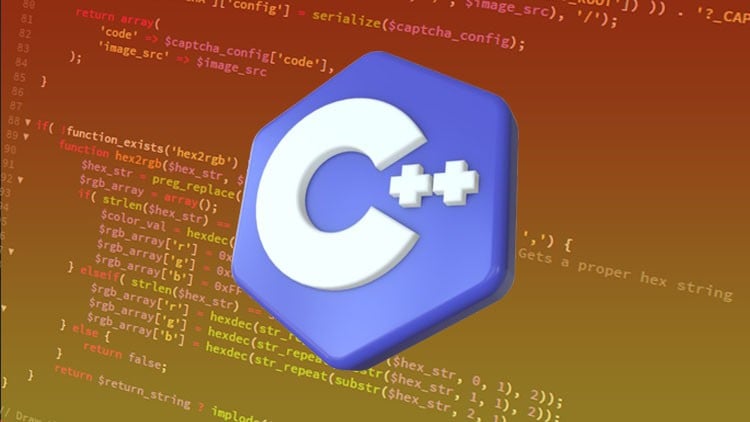
Familiarize yourself with the fundamentals of C++, including syntax, data types, control structures, and functions.
⏱️ Length: 5.0 total hours
⭐ 4.34/5 rating
👥 29,116 students
🔄 February 2024 update
Add-On Information:
Note➛ Make sure your 𝐔𝐝𝐞𝐦𝐲 cart has only this course you're going to enroll it now, Remove all other courses from the 𝐔𝐝𝐞𝐦𝐲 cart before Enrolling!
- Course Overview
- This comprehensive course is meticulously designed to transform absolute beginners into proficient C++ developers, guiding learners through a structured curriculum that progresses from foundational concepts to advanced programming paradigms. It establishes a robust understanding of C++’s core syntax and features, paving the way for tackling complex software development challenges. The journey emphasizes practical application, ensuring that theoretical knowledge is reinforced with hands-on coding exercises and real-world project scenarios, making it suitable for anyone aiming for a deep dive into systems programming, high-performance computing, or game development.
- Embark on an immersive learning experience that demystifies C++’s powerful capabilities, starting with fundamental programming logic and evolving into sophisticated object-oriented design principles. The curriculum is structured to build knowledge incrementally, allowing learners to confidently grasp intricate topics such as memory management, generic programming, and concurrency. Through expertly crafted lessons and practical demonstrations, participants will gain the skills necessary to write efficient, robust, and maintainable C++ applications, fostering a problem-solving mindset crucial for modern software engineering.
- Requirements / Prerequisites
- Basic Computer Literacy: Familiarity with operating a computer, managing files and folders, and using web browsers is essential for navigating the course materials and development environment. No prior programming experience is strictly required, as the course begins with the absolute fundamentals.
- Stable Internet Connection: Reliable access to the internet is necessary for streaming video lessons, accessing supplementary resources, and downloading necessary software components like compilers and Integrated Development Environments (IDEs).
- A Computer (Windows, macOS, or Linux): Access to a personal computer capable of running modern C++ compilers and IDEs is crucial for following along with coding examples and completing practical assignments. Specific software installation guides will be provided.
- Enthusiasm for Learning: A strong desire to learn programming and dedication to practicing coding concepts regularly will significantly enhance your learning outcome and mastery of C++.
- Skills Covered / Tools Used
- Object-Oriented Programming (OOP) Principles: Master the pillars of OOP including classes, objects, encapsulation, inheritance, and polymorphism, enabling the creation of modular, reusable, and scalable software designs.
- Advanced Data Structures: Implement and utilize essential data structures such as arrays, linked lists, stacks, queues, trees, and graphs, understanding their operational complexities and appropriate use cases for efficient problem-solving.
- Memory Management: Gain expertise in managing system memory using pointers, references, dynamic memory allocation (new/delete), and modern smart pointers (unique_ptr, shared_ptr, weak_ptr) to prevent memory leaks and improve application stability.
- Standard Template Library (STL): Become proficient in using a wide array of STL components, including containers (vector, list, map, set), algorithms (sort, find, transform), and iterators, to write highly optimized and concise C++ code.
- Exception Handling: Learn to implement robust error-handling mechanisms using try-catch blocks to manage runtime errors gracefully, ensuring application resilience and a better user experience.
- File Input/Output (I/O): Develop skills in reading from and writing to files, enabling persistent data storage and retrieval for various application needs, from configuration files to data logging.
- Templates and Generic Programming: Understand how to write flexible and type-agnostic code using function templates and class templates, promoting code reusability and reducing redundancy.
- Concurrency and Multithreading: Explore techniques for parallelizing tasks using C++’s threading library, mutexes, and condition variables, optimizing performance for CPU-bound operations in modern multi-core environments.
- Build Systems and Debugging: Work with popular C++ compilers (e.g., GCC, Clang) and learn to navigate Integrated Development Environments (IDEs) like VS Code or Visual Studio for efficient code writing, compilation, and debugging.
- Version Control with Git: Understand the basics of Git for managing code revisions, collaborating with others, and maintaining a professional development workflow.
- Benefits / Outcomes
- Foundation for Advanced Development: Build a rock-solid understanding of C++ that serves as a fundamental prerequisite for pursuing specialized fields like game development (Unreal Engine), high-performance computing, embedded systems, and competitive programming.
- Develop Robust Applications: Acquire the ability to design, implement, and debug sophisticated C++ applications from scratch, ranging from console utilities to complex object-oriented systems.
- Enhanced Problem-Solving Skills: Sharpen your analytical and logical thinking through extensive coding challenges and projects, improving your approach to solving real-world computational problems.
- Career Advancement: Position yourself for demanding and rewarding roles in software engineering, where C++ proficiency is highly valued for performance-critical applications and system-level programming.
- Code Optimization: Learn to write highly efficient and optimized C++ code, understanding performance implications of different language features and data structures.
- Understanding Complex Systems: Gain insights into how underlying operating systems and hardware interact with high-level code, which is crucial for systems programming and debugging.
- PROS
- High Student Satisfaction: The course boasts an excellent 4.34/5 rating from a large number of students, indicating high quality and effective teaching.
- Constantly Updated Content: With a February 2024 update, the course ensures learners are exposed to the latest C++ practices and standards.
- Beginner-Friendly Approach: Starts with core fundamentals, making complex concepts accessible to those with no prior programming background.
- Extensive Learner Base: Over 29,000 students have enrolled, signifying a well-vetted and popular learning resource.
- Practical Orientation: Emphasizes hands-on coding and practical examples, which is crucial for skill development.
- CONS
- Significant Time Investment Required: While the introductory section is 5 hours, mastering C++ from basic to expert demands considerable dedication and consistent practice beyond the course material.
Learning Tracks: English,Development,Programming Languages
Found It Free? Share It Fast!